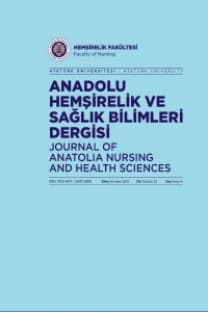SOLİD ORGAN TRANSPLANTASYONU SONRASI İMMÜNSUPRESİF İLAÇ KULLANIMINA UYUM
___
- Witt CA, Hachem RR. Immunosuppression: What’s Standart and What’s New. Seminars in Respiratory and Critical Care Medicine 2013;34(3):405-13.
- Williams AF, Manias E, Gaskin CJ, Crawford K. Medicine non-adherence in kidney transplantation. Journal of Renal Care 2014;40(2):107–16.
- Schaefer HM, Helderman HJ. Current and Emerging Maintenance Immunosuppressive Therapy. Türkiye Klinikleri Nefroloji Özel Dergisi 2012;5(3):1-9.
- Sandwijk MS, Bemelman FJ, Berg IJM. Immunosuppressive Drugs After Solid Organ Transplantation. Netherlands The Journal of Medicine 2013;71(6):281-89.
- Schmid-Mohler G, Pechula Thut M, Wuthrich RP, Denhaerynck K, De Geest S. Non-adherence to immunosuppressive medication in renal transplant recipients within the scope of the integrative model of behavioral prediction: a cross-sectional study. Clin Transplant 2010;24: 213–22.
- Sabate E. Adherence to Long-Term Therapies: Evidence for Action. First edition, Switzerland, World Health Organization, 2003.
- Russell C, Conn V, Ashbaugh C, Madsen R, Wakefield M, Webb A et al. Taking Immunosuppressive Medicaitons Effectively (TIMELink): A Pilot Randomized Controlled Trial in Adult Kidney Transplant Recipients. Clinical Transplantation 2011; 25(6):864-70.
- Prihodova L, Nagyova I, Rosenberger J, Majernikova M, Roland R, Groothoff JW et al. Adherence in patients in the first year after kidney transplantation and its impact on graft loss and mortality: a cross-sectional and prospective study. Journal of Advanced Nursing 2014;70(12):2871–83.
- Prendergast MB, Gaston RS. Optimizing medication adherence: an ongoing opportunity to improve outcomes after kidney transplantation. Clin J Am Soc Nephrol 2010;5:1305-11.
- Osterberg L, Blashchke T. Adherence to Medication. The New England Journal of Medicine 2005;353:487-97.
- Oliva M, Singh TP, Gauvreau K, VanderPluym CJ, Bastardi HJ, Almond CS. Impact of medication non-adherence on survival after pediatric heart transplantation in the USA. J Heart Lung Transplant 2013;32:881–8.
- Morrissey PE, Flynn ML, Lin S. Medication Noncompliance and its Implications in Transplant Recipients. Drugs 2007; 67(10):1463-81.
- Martínez Pérez AB, López Suárez A, Rodríguez Rodríguez J, Sobrino Márquez JM, Lage Galle E. Medication Adherence in Patients Who Undergo Cardiac Transplantation. Transplantation Proceedings 2013;45:3662-64.
- MacLaughlin EJ, Raehl CL, Treadway AK, Sterling TL, Zoller DP, Bond CA. Assessing Medication Adherence in The Elderly. Which Tools to Use in Clinical Practice?. Drug Aging 2005;22(3):231-55.
- Kung M, Koschwanez HE, Painter L, Honeyman V, Broadbent E. Immunosuppressant Nonadherence in Heart, Liver, and Lung Transplant Patients: Associations with Medication Beliefs and Illness Perceptions. Transplantation 2012; 93(9):958-63.
- Kalogianni A. Can Nursing Interventions increase adherence medication regimen? Health Science Journal 2012;6(1):1-3.
- Hoy H, Alexander S, Payne J, Zavala E. The Role of Advanced Practice Nurses in Transplant Center Staffing. Progress in Transplantation 2011;21(4):294- 298.
- Ho PM, Magid DJ, Shetterly SM, Olson KL, Maddox TM, Peterson PN et al. Medication nonadherence is associated with a broad range of adverse outcomes in patients with coronary artery disease. Am Heart J 2008;155:772–9.
- Ho PM, Bryson CL, Rumsfeld JS. Medication Adherence Its Importance in Cardiovascular Outcomes. Circulation 2009;119:3028-35.
- Hartono C, Muthukumar T. Immunsuppressive Drug Therapy. Cold Spring Harbor Perspectives in Medicine 2013;3(9):1-15.
- Gould E, Mitty E. Medication Adherence is a Partnership, Medication Compliance is Not. Geriatric Nursing 2010;31(4):290-98.
- Fredericks EM, Magee JC, Opipari-Arrigan L, Shieck V, Well A, Lopez MJ. Adherence and Health-Related Quality of Life in Adolescent Liver Transplant Recipients. Pediatric Transplant 2008;12(3):289-299.
- Frank-Bader M, Beltran K, Dojlidko D. Improving Transplant Discharge Education Using A Structured Teaching Approach. Progress in Transplantation 2011;21(4):332-39.
- Eldegez UC, Seyhun Y. Türkiye’ de ve Dünyada Transplantasyonun Tarihçesi. Türkiye Klinikleri Dergisi Genel Cerrahi Özel Dergisi 2013;6(1):1-6.
- Dobbels F, Lut Berben L, De Geest S, Drent G, Lennerling A, Whittaker C. The Psychometric Properties and Practicability of Self-Report Instruments to Identfy Medication Nonadherence in Adult Transplant Patients: A Systematic Review. Transplantation 2010;90(2):205-19.
- Dew MA, Di Martini AF, De Vito Dabbs A, Myaskovsky L, Steel J, Unruh M et al. Rates and Risk Factors for Nonadherence to the Medical Regimen After Adult Solid Organ Transplantation. Transplantation 2007;83:858-73.
- Dew MA, DeVito Dabbs A, Myaskovsky L, Shyu S, Shellmer DA, DiMartini AF et al. Meta-Analysis of Medical Regimen Adherence Outcomes in Pediatric Solid Organ Transplantation. Transplantation 2009;88(5):736–46.
- De Bleser L, Matteson M, Dobbels F, Russell C, De Geest, S. Interventions to Improve Medication Adherence After Transplantation: a systematic review. Transplant International 2009;22:780-97.
- De Bleser L, Dobbels F, Berben L, Vanhaecke J, Verleden G, Nevens F et al. The Spectrum of Nonadherence with Medication in Heart, Liver, and Lung Transplant Patients Assessed in Various Ways. Transplant International 2011;24:882-91.
- Brown M, Bussell JK. Medication Adherence: WHO Cares? Mayo Clinic Proceedings 2011;86(4):304-14.
- Berquist RK, Berquist WE, Esquivel CO, Cox KL, Wayman KI, Litt IF. Non-Adherence to PostTransplant Care: Prevalence, Risk Factors and Outcomes in Adolescent Liver Transplant Recipients. Pediatric Transplantation 2008;12:194–200.
- Balkrishnan R. The Importance of Medication Adherence in Improving Chronic-Disease Related Outcomes: What We Know and What We Need to Further Know. Medical Care 2005;43:517.
- Ayna KT, Çiftçi ŞH, Tozkır H, Gürteki M, Çarin M. İmmunsupresif İlaçların Etki Mekanizmaları. Gaziantep Tıp Dergisi 2009;15(3):42-7.
- ISSN: 1309-5471
- Yayın Aralığı: Yılda 4 Sayı
- Yayıncı: Atatürk Üniversitesi Hemşirelik Fakültesi
GÜVENLİ CERRAHİ KONTROL LİSTESİNİN ETKİNLİĞİ: SİSTEMATİK İNCELEME
Özlem SOYER, Meryem YAVUZ VAN GIERSBERGEN
Hemşirelerin İşitme Engelli Bireylere Yönelik Tutumlarının Belirlenmesi
Ferya ÇELİK, Nurten TERKEŞ, Emine USLULAR, Özlem ŞAHİN, Latif SAVAŞ, Ayşe KARATEKE, Gülzade DUYGUN, Hilal KAHRAMAN
İLKÖĞRETİM ÖĞRENCİLERİNİN ÇEVRE BİLGİ VE TUTUMLARININ DEĞERLENDİRİLMESİ
Figen ÇAVUŞOĞLU, Birsen ALTAY, Gülşat NURİYEVA, Buket ÖNGÖR
BİR SİGARA BIRAKMA POLİKLİNİĞİNDE UYGULANAN PSİKOEĞİTİMSEL SİGARA BIRAKMA POROGRAMININ ETKİNLİĞİ
Mustafa ERMAN, Deniz YÜCE, Mutlu HAYRAN, İsmail ÇELİK, Saadettin KILIÇKAP, Songül KAMIŞLI, Şennur KÜÇÜKÇOBAN
YABANCI UYRUKLU ÜNİVERSİTE ÖĞRENCİLERİNİN SORUNLARININ İNCELENMESİ: KONYA ÖRNEĞİ
Tahsin GEÇKİL, Selda BAŞARAN ALAGÖZ
Bir sigara bırakma polikliniğinde uygulanan psikoeğitimsel sigara bırakma programının etkinliği
Songül KAMIŞLI, Deniz YÜCE, Şennur KÜÇÜKÇOBAN, Mutlu HAYRAN, Saadettin KILIÇKAP, İsmail ÇELİK, Mustafa ERMAN
İLKÖĞRETİM ÖĞRENCİLERİNİN ÇEVRESEL TUTUM VE ÇEVRE BİLGİSİNİN İNCELENMESİ
Figen ÇAVUŞOĞLU, Birsen ALTAY, Gülşat NURİYEVA
Ameliyat Korkusu Hastaları Uyutmuyor mu?
Özlem ŞAHİN ALTUN, Zeynep KARAMAN ÖZLÜ, Merve KAYA, Zeynep OLÇUN
İNFORMAL BAKIM VERENLERİN BAKIM YÜKÜNE İLİŞKİN HEMŞİRELERİN GÖRÜŞLERİ
Keziban TÜRKEN GEL, Makbule TOKUR KESGİN
